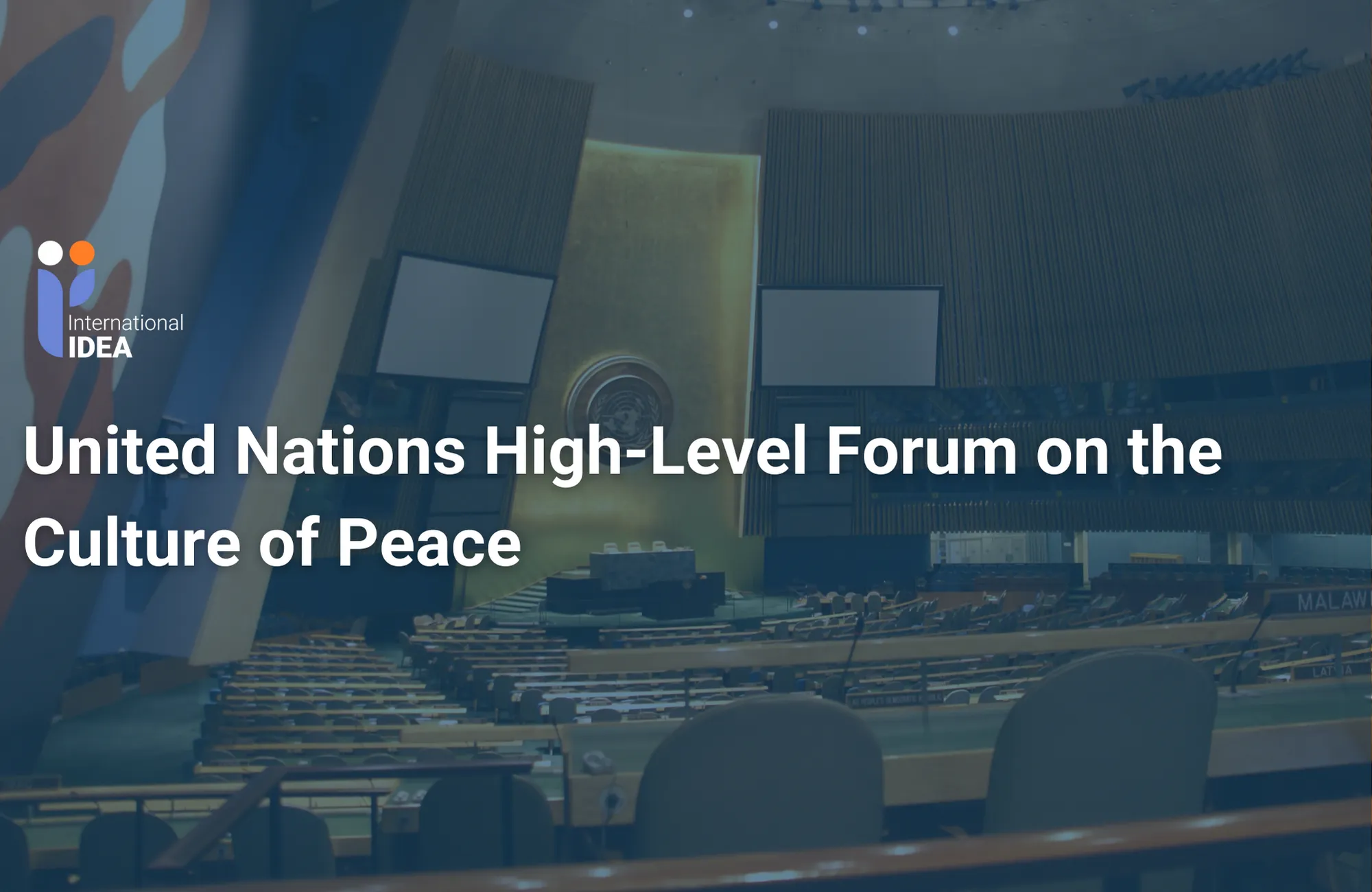Statement at the High-Level Forum on the Culture of Peace

United Nations High-Level Forum on the Culture of Peace
Thursday, 6 September 2022
UN Headquarters, New York
Statement by Mr. Massimo Tommasoli
Permanent Observer for International IDEA to the United Nations
Mr. President, Excellencies,
Peace, a pillar of UN work, cannot be taken for granted. Like democracy, it has to be nurtured, promoted and protected. Just as International IDEA supports sustainable democracy worldwide, we also champion peace and conflict prevention, with the promotion of a culture of peace as a key dimension of both peacebuilding and democracy building.
The global pandemic has exacerbated processes and conditions that already affected peace and conflict dynamics in the world. The fragility of institutional responses in many countries has increased vulnerability to the pandemic and its disrupting economic, social, cultural and political consequences. These phenomena are compounded by the ramification of the war of aggression by the Russian Federation in Ukraine, which has sparked food scarcity – and a global food crisis – as well as deadly economic effects impacting the most vulnerable segments of populations in the region and beyond, like the growth of interest rates, debt levels, gas and oil prices and food prices. This situation increases the risks of a global recession, while the impact of climate change is more and more evident in many vulnerable ecosystems, with implications for peace and conflict dynamics.
At a time when international cooperation and a functioning rules-based international order are more needed than ever to face such global threats, the war has exposed the inherent fragility of multilateral institutions. This context challengesthe implementation of global agendas that were adopted through consensus before the crisis. This danger is worrying as 2023 will be mid-point in the implementation of the 2030 Agenda for Sustainable Development and the Sustainable Development Goals (SDGs).
As reported in the forthcoming Global Report of the SDG16 Data Initiative, between 2004 and 2020, the world was struck by at least 41 major conflicts , resulting in 1,7 million fatalities, including men, women, and children. However, despite a reduction in the number of conflicts, the number of related fatalities dramatically increased from an annual average of 75 thousand, during the period 2004-2015 to 152 thousand between 2016-2020. Between these two periods, the average rate of global conflict-related deaths rose by 83 per cent from 1.1 to 2.0 fatalities per 100,000 population. In the middle of a devastating war waged by Russia against Ukraine, the call of the UN Secretary-General to find alternative solutions to fighting is more important than ever to significantly reduce all forms of violence and related death rates everywhere. This necessity is even more critical because, as stressed by the World Bank over ten years ago, no low-income fragile or conflict-affected country achieved a single United Nations Millennium Development Goal.
In fact, the 2030 Agenda for Sustainable Development has in many respects anticipated some of the key elements that should guide national, regional and global responses to the ongoing crises. A pillar of this approach is the implementation of the SDG16 plus – on peace, justice and institutions – which shows the importance of trust in accountable institutions and processes as a fundamental public good.
Against this backdrop, International IDEA’s latest Global State of Democracy (GSoD) Indices data reveal an increase in the number of backsliding democracies; the number of countries moving towards authoritarianism is more than double the number moving towards democracy. As of 2021, one-fifth of the countries covered by the GSoD Indices are experiencing democratic erosion, defined as declines in at least one sub-attribute of democracy; only two percent are benefiting from democratization. In one way, it is hardly surprising that democratization has stagnated. As underscored by the S-G Guterres in Our Common Agenda, a renewal of the social contract, or the implicit agreement that exists between governments and their people regarding “what we owe each other”, has long been needed.
The analysis of International IDEA on democracy building processes, including through The Democracy Tracker, shows that a home-grown and well-informed constitutional culture is an integral part of democratic transitions and sustainable peace. Within countries, inclusive governance and adherence to fundamental rights can help a great deal in overcoming challenges to peace, parting ways with a violent past and building a new social contract to respond to the global crisis.
The role of youth, women, and civil society actors is fundamental in order to build confidence and trust in public action. International IDEA renews its commitment to working, in partnership with the UN system, regional organizations and other stakeholders, to foster a culture of peace through dialogue, by building confidence in the integrity of democratic institutions, and by supporting country and international efforts at recovery for peaceful, just and inclusive societies.
I thank you, Mr. President